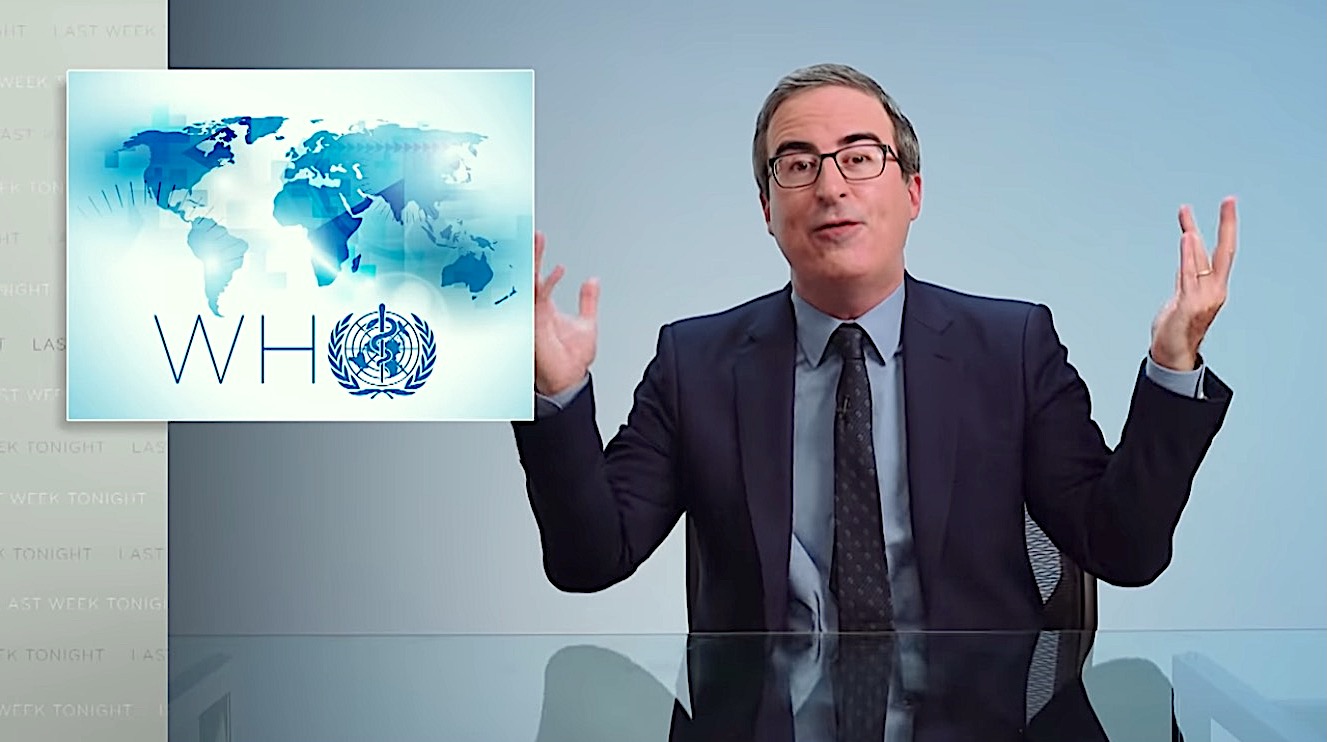John Oliver says Trump's 'dangerous' push to pull the U.S. from the WHO is also 'on the ballot this year'


A free daily email with the biggest news stories of the day – and the best features from TheWeek.com
You are now subscribed
Your newsletter sign-up was successful
The World Health Organization is one of President Trump's "favorite punching bags," John Oliver said on Sunday's Last Week Tonight. "Over the last six months, Trump has constantly tried to deflect blame for his handing of the coronavirus onto the WHO, China, and the close relationship that he claims the two have" — so much so he "decided to withdraw the United States from the WHO," and "the clock is ticking."
"Given that we're now on track to leave the WHO in less than a year, tonight let's talk about what that actually means — how important the WHO's work is, how valid criticisms of it are, and what we might be putting at stake," Oliver said. "One of the biggest powers it has is the ability to declare a 'public health emergency of international concern,' and issue recommendations on how countries should respond." And despite the WHO having "absolutely no power on its own to enforce those recommendations," he said, "it's managed to do some incredible things in the past," including eradicating smallpox, nearly wiping out polio, and overseeing the more "tedious" task of developing the annual flu vaccine, all on a budget around the same size as a large U.S. hospital.
Oliver put Trump's main critiques of the WHO in context and explained why the U.S. walking away from the organization — not trying to fix its problems — would be misguided and counterproductive, "especially in the middle of a global pandemic."
The Week
Escape your echo chamber. Get the facts behind the news, plus analysis from multiple perspectives.

Sign up for The Week's Free Newsletters
From our morning news briefing to a weekly Good News Newsletter, get the best of The Week delivered directly to your inbox.
From our morning news briefing to a weekly Good News Newsletter, get the best of The Week delivered directly to your inbox.
"This is yet another depressing example of Trump seeing something that involves shared sacrifice, trade-offs, and complexity and decided to just blow it up because he either doesn't understand it, doesn't care, or both," and it's "incredibly dangerous," Oliver said. "We're currently on track to leave the WHO on July 6 of next year — if, that is, Trump is re-elected. And this means our membership in the WHO is yet another important thing on the ballot this year. And even though Trump likes to pretend that we can insulate ourselves from the rest of the world, if the coronavirus has shown us anything, it's that diseases don't recognize borders, and we're only as strong as our worst-prepared country." There is quite a bit of NSFW language. So consider putting on headphones when you watch below. Peter Weber

A free daily email with the biggest news stories of the day – and the best features from TheWeek.com
Peter has worked as a news and culture writer and editor at The Week since the site's launch in 2008. He covers politics, world affairs, religion and cultural currents. His journalism career began as a copy editor at a financial newswire and has included editorial positions at The New York Times Magazine, Facts on File, and Oregon State University.
-
 Quiz of The Week: 7 – 13 February
Quiz of The Week: 7 – 13 FebruaryQuiz Have you been paying attention to The Week’s news?
-
 Nordic combined: the Winter Olympics sport that bars women
Nordic combined: the Winter Olympics sport that bars womenIn The Spotlight Female athletes excluded from participation in demanding double-discipline events at Milano-Cortina
-
 Samurai: a ‘blockbuster’ display of Japanese heritage
Samurai: a ‘blockbuster’ display of Japanese heritageThe Week Recommends British Museum show offers a ‘scintillating journey’ through ‘a world of gore, power and artistic beauty’
-
 Epstein files topple law CEO, roil UK government
Epstein files topple law CEO, roil UK governmentSpeed Read Peter Mandelson, Britain’s former ambassador to the US, is caught up in the scandal
-
 Iran and US prepare to meet after skirmishes
Iran and US prepare to meet after skirmishesSpeed Read The incident comes amid heightened tensions in the Middle East
-
 EU and India clinch trade pact amid US tariff war
EU and India clinch trade pact amid US tariff warSpeed Read The agreement will slash tariffs on most goods over the next decade
-
 Israel retrieves final hostage’s body from Gaza
Israel retrieves final hostage’s body from GazaSpeed Read The 24-year-old police officer was killed during the initial Hamas attack
-
 China’s Xi targets top general in growing purge
China’s Xi targets top general in growing purgeSpeed Read Zhang Youxia is being investigated over ‘grave violations’ of the law
-
 Panama and Canada are negotiating over a crucial copper mine
Panama and Canada are negotiating over a crucial copper mineIn the Spotlight Panama is set to make a final decision on the mine this summer
-
 Why Greenland’s natural resources are nearly impossible to mine
Why Greenland’s natural resources are nearly impossible to mineThe Explainer The country’s natural landscape makes the task extremely difficult
-
 Iran cuts internet as protests escalate
Iran cuts internet as protests escalateSpeed Reada Government buildings across the country have been set on fire
